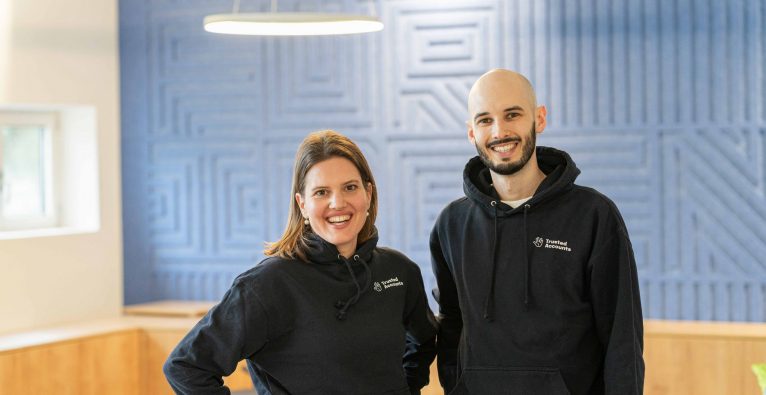✨ AI Kontextualisierung
Plastikmüll ist sexy, aber Bauabfall nicht? Wenn es um Nachhaltigkeit und die Folgen der Klimakrise geht, weiß Freia Ruegenberg so viel wie wenige andere. Und darunter auch, dass Bauabfall durchaus sexy sein kann – oder es sein muss. Die studierte Chemikerin unterrichtete nach ihrer Promotion an der Innsbrucker Universität – mit dem Ziel, unseren Planeten zu retten. Später wurde sie unerwartet zur Startup-Gründerin. Dem Klima zuliebe versucht sie nun, in der Baubranche mitzumischen.
ParaStruct am 4GameChangers Festival
Ruegenberg will Sichtbarkeit für ein Thema schaffen, das in der Öffentlichkeit nicht wirklich präsent ist: “Das Thema Plastikmüll ist in aller Munde – und sehr populär. Aber die Bauindustrie spielt auch ihre Rolle im Klimawandel – und zwar eine nicht unwesentliche. Wir alle wohnen und leben in Gebäuden, wir nutzen und bauen Gebäude. Auch, wenn das Thema nicht so sexy ist wie andere Nachhaltigkeitsthemen. Eine nachhaltige Baubranche ist wichtiger denn je.”
Als Co-Founder und Chief Scientific Officer des DeepTech-Startups ParaStruct wird Ruegenberg am heute beginnenden 4GameChangers Festival in Wien vertreten sein. Das Panel „Innovations Changing The World” findet auf der Silent Stage am heutigen Dienstag, den 14. Mai, um 15.10 Uhr statt. Sprechen wird sie über ihr Startup ParaStruct und dessen Beitrag zu einer nachhaltigen Baubranche. Gestreamt werden kann das 4GameChangers Festival für alle, die nicht dabei sein können, auch auf Joyn.
Im Interview mit brutkasten spricht sie über ihren unerwarteten Weg in das Startup-Leben, über Abfallprodukte der Baubranche und was sie aus Sand und Staub im 3D-Drucker zaubern kann, um die Welt zu retten. Stichwort Welt: Auch für außerirdisches Leben könnte ParaStruct interessant sein.
brutkasten: Wie bist du dazu gekommen, ParaStruct zu gründen?
Freia Ruegenberg: Meine Geschichte ist nicht die lineare Startup-Gründer:innen-Geschichte. Wenn mir jemand vor fünf Jahren gesagt hätte, dass ich Co-Founderin eines Startups werde, hätte ich gelacht und den Vogel gezeigt.
Ich komme nicht aus einer unternehmerischen Familie, ich habe Chemie studiert und mich auf Materialwissenschaften spezialisiert. Das Studium habe ich aus der Motivation heraus angefangen, mit meiner Arbeit zu mehr Nachhaltigkeit beizutragen. Dazu motiviert hat mich unter anderem der Film “Plastic Planet”. Schon damals habe ich mir gedacht: Es ist total krass, dass es solche Abfallmengen gibt. Wir müssen da auf jeden Fall nach einer Lösung suchen.
Nach dem Film “Plastic Planet” hast du also begonnen, Chemie zu studieren?
Genau. Zu diesem Zeitpunkt war für mich Chemie genau das Richtige. Spezialisiert habe ich mich auf anorganische Chemie. Dort habe ich auch promoviert und war nach meinem Studium an der Universität Innsbruck in der Lehre tätig.
Wann kam es dann zur Gründung von ParaStruct?
Ziemlich unerwartet: Der Hauptgründer Georg Breitenberger ist damals auf mich und meinen Kollegen zugekommen, weil er zu dem Zeitpunkt nach Projektpartner:innen gesucht hat. Er wollte die Recyclingfähigkeit von mineralischen Bindemitteln untersuchen. Die Idee von ParaStruct gibt es also schon länger – und wurde anfangs von Georg Breitenberger als Einzelunternehmen geführt. Der Fokus lag damals auf 3D-Druck und der Verwertung von Abfällen mit 3D-Druck. In weiterer Folge bin ich mit Kilian Rießbeck ins Unternehmen eingestiegen. Darüber bin ich sehr glücklich, weil ich jetzt meiner ursprünglichen Motivation der Abfallvermeidung nachgehen kann.
Wie und welchen Abfall vermeidet ParaStruct?
Im Grunde entwickeln wir eine Lösung, mit der die Bauindustrie – aber auch andere herstellende Industrien – ihre drei größten Probleme beseitigen oder zumindest mildern können.
Was sind die drei größten Probleme der herstellenden Industrien?
Erstens die Ressourcenknappheit bzw. -abhängigkeit. Gerade die Bauindustrie braucht Materialien, die häufig nur an einem bestimmten Ort und in begrenzter Verfügbarkeit vorkommen – und deshalb immer knapper werden.
Das zweite Problem sind die Treibhausgasemissionen: Die Bauindustrie ist einer der größten Emittenten von Treibhausgasen überhaupt – hier vor allem bei der Herstellung von Zement, der enorm CO2-intensiv ist.
Das dritte Problem sind Abfallmengen: Statistiken des BMK (Anmerkung: Bundesministerium für Klimaschutz, Umwelt, Energie, Mobilität, Innovation und Technologie) zeigen, dass etwa drei Viertel der in Österreich anfallenden Abfälle allein aus der Bauindustrie – also von Abbruchmaterialien und Bauabfällen – kommen.
Mit ParaStruct wollen wir genau diese drei Probleme angehen. Und es ist auch irgendwo paradox, dass Industrien sehr große Mengen an Abfallmaterialien produzieren und dann einem Mangel an Ressourcen und Rohstoffen gegenüberstehen. Das heißt: Das Logische ist natürlich, Abfallmaterialien besser nutzbar zu machen.
Wie können wir uns das vorstellen – welche Abfälle recycelt ihr?
Wir bieten eine kreislauffähige Lösung für ansonsten nicht mehr nutzbare Abfällen und Nebenprodukte: Das sind häufig Sande, Stäube und Material, dass in unterschiedlichen Verarbeitungsschritten übrigbleibt. Gerade die sind für die Industrie nicht mehr nutzbar, weil sie eben zum Beispiel aufgrund ihrer physikalischen Eigenschaften nicht weiterverwendet werden können. Wir aber machen sie mit unserem 3D-Drucker wieder nutzbar.
Das heißt, ihr recycelt Staub und Sand mit 3D-Druckern?
Genau, unter anderem. 3D-Druck ist dabei aber, sagen wir mal, eine Option und keine Notwendigkeit. Die Abfallmaterialien können auch konventionell verarbeitet werden. Aber 3D-Druck bietet sich insofern an, als dass man funktionale und ästhetisch anspruchsvolle Bauteile herstellen kann – und man spart Ressourcen, denn: 3D-Druck durch die additive Fertigung Material-sparender und auch automatisierbar, was auch ein Weg sein kann, um mit dem Fachkräftemangel umzugehen. Aktuell arbeiten wir an unserer ersten größeren Pilotanlage mit einem Maschinenbaupartner. Diese Anlage wird dann in der Lage sein, großformatige Muster mit zu drucken. Auch erste Kund:innen sind bereits interessiert.
Für welche Branchen eignen sich die recycelten Materialien von ParaStruct?
Unter anderem für die Bauindustrie – darunter Holzbau und Stahlindustrie. Wir sind Technologieanbieter – das heißt: Wir entwickeln den Prozess und die Materialmischung und können auch geeignete Anwendungen für die jeweilige Industrie entwickeln. Und durch unseren Recyclingprozess sind alle so hergestellten Bauprodukte voll kreislauffähig.
Zum Beispiel für ein Holzbauunternehmen, das Schalungen für den Bau herstellt. Dafür schauen wir uns an: Welche Produkte stellt das Unternehmen bereits her? Und wir versuchen dann, aus den Abfällen, die dieses Unternehmen produziert, entsprechende Produkte herzustellen. Das heißt, für Holzunternehmen können wir eine 3D-gedruckte, recyclefähige Schalung produzieren. Wir greifen also nicht in den Kernprozess der Unternehmen ein, sondern erweitern ihre Angebotspalette um ein nachhaltiges Produkt.
Es gibt aber auch andere Industrien, zum Beispiel die Stahlindustrie, die mit mineralischen Abfällen aus der Stahlproduktion zu kämpfen haben. Grundsätzlich eignen sich alle Industrien, die mit Verfahren oder Fertigungsprozessen arbeiten, in denen Materialien zerkleinert werden, die dann in Form von Sanden oder feinen Stäuben übrig bleiben und somit eben nicht mehr nutzbar und wertlos sind, deponiert oder abtransportiert werden müssen. Das findet man auch bei Steinbrüchen oder Schotterwerken in der Rohstoffgewinnung.
ParaStruct hat sich auch mit dem Ziel auseinandergesetzt, extraterrestrischen Raum bewohnbar zu machen. Wie wollt ihr das angehen?
Bei extraterrestrischen Räumen sprechen wir ja auch von Planetenoberflächen – wie der Oberfläche von Mars oder Mond. Wenn wir die besiedeln wollen, müssen wir mit speziellen Herausforderungen zurechtkommen. Zum einen möchte man die Materialien, die vor Ort sind, nutzen, weil man ja nicht beliebig viel dorthin transportieren kann. Auf Mond oder Mars haben wir auch extreme Bedingungen, die sehr feine Stäube und Sande auf der Oberfläche verursachen. Genau das ist ja unser Ausgangsmaterial für den 3D-Druck. Das heißt, wir können Mondstaub zu modularen Baukomponenten mit unserem 3D-Druck umwandeln – und zwar materialsparend und automatisierbar.
Siehst du Potential in der Besiedelung von außerirdischem Raum?
Meine Meinung zum Leben oder der Forschung auf anderen Planeten ist: Man muss die Fühler in alle Richtungen ausstrecken. Ich sehe unseren Auftrag jetzt primär auf der Erde: Zuerst müssen wir die Probleme, die wir hier haben, bewältigen. Der Fokus sollte aktuell auf dem Planeten Erde liegen.
Die Raumforschung ist natürlich für sehr viele Entdeckungen und Entwicklung verantwortlich, die wir jetzt auch auf der Erde nutzen. Forschung ist immer wichtig, egal mit welchem Ziel sie gemacht wird. Allerdings sehe ich persönlich kurz- bis mittelfristig mehr Potenzial darin, die Zerstörung auf unserem Planeten Erde einzudämmen, anstatt zum nächsten Planeten weiterzuziehen. Bis wir so weit sind, dass wir auch nur einen Teil der aktuell acht Milliarden auf der Erde lebenden Menschen auf andere Planeten verfrachten können, wird das noch eine ganze Weile dauern. Wir sollten nicht zu viel Zeit damit verschwenden, andere Planeten bewohnbar zu machen, sondern viel eher diesen wunderschönen Planeten erhalten.
Wie schätzt du die Chancen ein, die Folgen des Klimawandels auf der Erde einzudämmen?
Ich bin realistisch: Wir merken die Folgen des Klimawandels jetzt schon. Und das wird in Zukunft noch schlimmer werden. Trotzdem glaube ich, dass die Menschheit es schaffen könnte, den Planeten Erde als lebenswerten Planeten zu erhalten. Aber natürlich müssen wir da sofort anfangen. Am besten schon vorgestern – je schneller, desto besser.
Wo muss besonders viel getan werden?
Kurz gesagt: Überall. Aber: Etwa 40 Prozent des CO2-Ausstoßes kommen von der Bauindustrie – je nach Statistik und was dort alles mit berücksichtigt wird. Die Bauindustrie ist neben Verkehr und Landwirtschaft einer der größten Player im Klimawandel – und heute eines der größten Gewerbe überhaupt, wo was passieren kann und muss. Ich bin gegen die Einstellung „…ja aber der andere Sektor, das andere Land ist viel schlimmer“. Wir müssen alle Bereiche anfassen und Dinge sofort ändern – aber die Bauindustrie ist sicher eine der wichtigsten. Und: Wir sind ja Gott sei dank nicht das einzige Startup, das sich mit Innovation in der Bauindustrie oder mit CO2-Einsparungen beschäftigt. Da liegt viel Potenzial in der Startup-Szene und das muss genutzt werden.
*Disclaimer: Dieser Artikel entstand im Rahmen einer Kooperation mit dem 4GameChangers Festival 2024.





